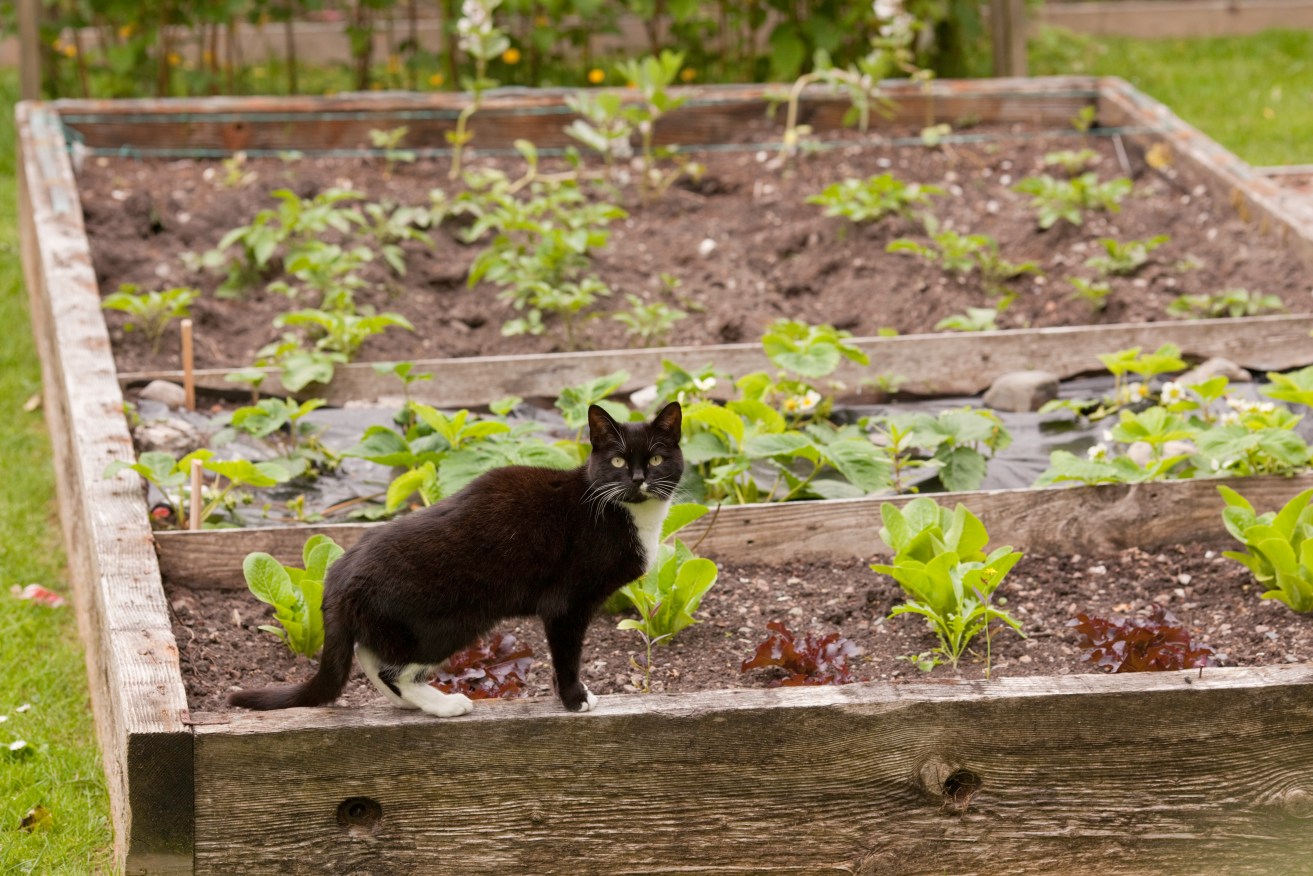Why you need to protect your veggie garden from animal poop


Beware of your cat: a sinister plot might be lurking behind all that cuteness. Photo: Getty
Ordinarily, we think of gardening as a life-enhancing pastime.
Why not? There’s the elemental pleasure of running one’s fingers through the dark and composted, almost biscuit-smelling soil.
Cool to the touch are the leaves and stems, the baby-skin texture of petals. The anticipation of clean, fresh foods.
Perhaps, being at one with the earth, you turn a blind eye to your beloved cat squatting and seasoning the garden plot with his peculiar manure.
It’s all organic, right?
Sure. So are those death-cap mushrooms we keep hearing about.
So is the powdery mould you tend to find in a poorly turned and rancid bed.
All of this leads us to an uncomfortable truth – when your pets use the vegetable planting as a toilet, they’re carelessly poisoning you and the kids. And perhaps, also, the new neighbours you welcomed with home-grown tomatoes and zucchini.
Hence the warning put out this week by the Food Safety Information Council (FSIC):
“People need to make sure home-grown produce doesn’t get contaminated with animal faeces that can make them sick.”
How? Installing bird-safe mesh and fences high enough to keep animals out. That’s a bit of work. Plus, the FSIC advises covering sandpits when the littlies aren’t playing in them.
Is it really necessary? Here’s what the research says
Research funded by SA Health found that four in 10 Australians grow their own vegetables and/or fruit in their backyard or in community gardens.
Of these, 60 per cent said they protected their gardens from animals, and this rose to 66 per cent of gardeners who were cat owners.
Cats are the biggest risk, said Lydia Buchtmann, the FSIC’s head of communications, because they can pass on the infective stage of Toxoplasma parasites through their faeces.
A Food Standards Australia report estimated there were 15,500 cases of Toxoplasma Gondii infection in Australia during 2019 costing $13.1 million in lost productivity and mortality.
“This is mainly transmitted by cat faeces,” Buchtmann said.
Only 17 per cent of Australians have heard of toxoplasmosis, 25 to 30 per cent of Australians show signs of past Toxoplasma infections.
“Toxo infections can be fatal for unborn babies and people with immune problems. Women in their 30s have the greatest recognition of toxo probably because of pregnancy education,” Buchtmann said.
Five tips to avoid disease and poisons
How to avoid food-borne diseases and toxins, such as lead, polluting your garden:
- Locate your veggie beds in a safe spot. Locate your veggie patch and herbs in a convenient spot but choose a site away from potential hazards. For example, if you have an older building, avoid using soil that could have been contaminated by scrapings of lead paint from many years ago or soil close to the street where it might have been contaminated by leaded petrol
- Compost safely. Veggies need lots of nutrients but make sure any compost is well composted before use as the heat generated by the composting process not only kills any weed seeds but also helps kill food-poisoning bacteria. Prevent easy access to your compost bin by vermin and pests like mice and rats. Don’t compost meat scraps that can attract vermin
- Use clean water. If you want to recycle ‘grey’ water from the washing machine water it will contain microbes. So don’t put it on to the edible parts of fruit, vegetables or herbs growing in the garden
- Follow instructions on garden chemicals. Minimise the use of garden chemicals like pesticides and herbicides and make sure you follow the directions on the label exactly. Don’t spray other areas of the garden in windy conditions in case the spray drifts onto fruit and vegetables. Some chemicals will have withholding periods you must follow before you harvest any fruit or vegetables that have been sprayed
- Wash your fruit and veg before eating. Scrubbing and washing them just before eating, under clean running water will remove loose soil and may remove many bacteria and viruses, as can removal of the skin. If you are gardening near marshy areas or grazing paddocks avoid liver fluke by properly cooking vegetables.








